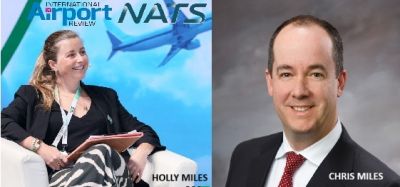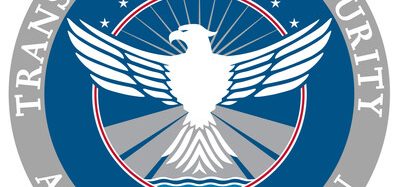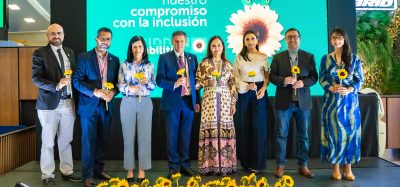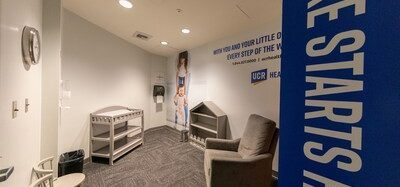Piétrick Voyer: An Airport Leader of the Future
Posted: 15 July 2025 | Holly Miles, Piétrick Voyer | No comments yet
Piétrick,Voyer, Director of Operations at Grantley Adams International Airport, was named International Airport Review’s Airport Leader of the Future at the 2024 Airport Honour Awards. In this exclusive interview he reveals his leadership style, what energises him and advice for the future generation of airport leaders.
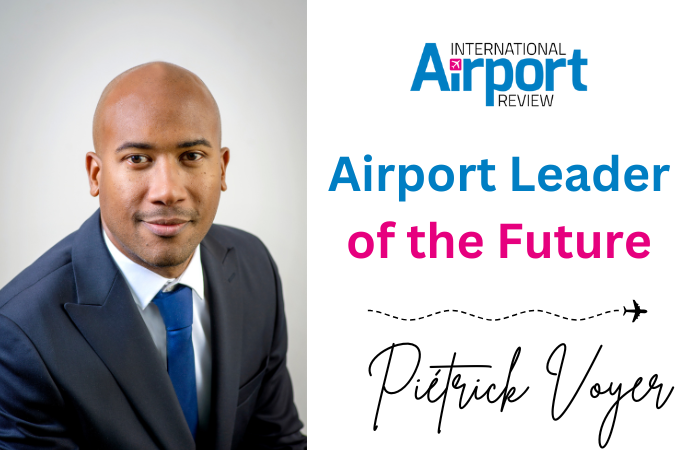

Firstly, congratulations on having been named our Airport Leader of the Future 2024. How does it feel?
It feels good! This is especially so because I work in a small airport, and the other candidates were from larger airports. It is great to see that regardless of where you work, what matters is what you have done so far and what you bring to the industry.
What was your route into aviation?
I am originally from Martinique in the French Caribbean. When I was very young it was an event to travel. People used to wear very nice shirts, jackets for the occasion, and I was so lucky that my parents took us on a trip to France when I was just five years old. I just fell in love with the fact that when you travel, in a few hours you can be exploring somewhere so very different. So that was my first crush with aviation. I decided I wanted to work in this environment to bring cultures together, to bring people together, because I think that’s a wonderful thing.
How would your colleagues describe you as a leader?
I believe they would say that I’m someone calm. I’m someone who listens. I’m someone who empowers people. My colleagues would say I get things done, but I’m not a pushy person. For me, being a leader is about getting people together. It’s about providing everyone with clear guidance, with objectives which we have defined together.
How do you create an engaging and empowering work environment for your colleagues?
It starts with yourself. I think it’s about being transparent and being open to communication; because if you are not doing it yourself, why would others do it? It also starts with consistency. Create consistent, open, transparent communication and then give space to people. So tell them what is required, what is needed, but let them take over essentially. Let them make mistakes and not be afraid to do this. They need to learn that it’s okay to take the initiative, it’s okay for things to go wrong, because we learn from them. For me, creating an engaging and empowering work environment comes from being transparent about what I do well, what I do not so well, and allowing others to seize the example and say, okay, this is a safe space in which we can talk without pointing fingers.
What is a skill that you are currently working on?
I’ve thought about this question a lot and my answer might seem cheesy, but I assure you it’s genuine. There is not just one skill that I need to work on specifically. I work every day on all skills. I think you always learn to adapt, to adjust, as who you were 10 years ago is not who you are today. The people you managed 10 years ago are not the same people of today and of tomorrow. So, overall I work on the skills of creating a cohesive team. I work on this all the time and this includes so many aspects – listening, communicating, reporting, analysing, and empowering people.
Who would you say you have learned from?
A lot of people. I’ve been very lucky to have had great bosses and they all have one common gift – they all gave me space. They gave me space to do what I believed was right, and when it wasn’t, that was okay. This is what I keep in mind in encouraging my own team.
When I was in Abu Dhabi, we had an operation failure at night. We had implemented a new baggage control centre and that first night, disaster struck! We had so many bags not connecting. But a senior staff member told me something I’ve never forgotten. He said: “It’s okay, things happen. Sometimes you need chaos to get better.”
Sometimes you need chaos to get better”
A second great piece of advice, which someone gave me, is to never underestimate the power of a thank you. This stays with me all the time because many think that money is the only way to motivate people. But when you empower people, when you recognise their contribution, when you recognise that they matter, you can transform a team. So yes, money is important, but equally so is how well you treat your staff – and it has to be genuine.
Another piece of wisdom someone has shared is, you don’t know what you don’t know. I’ll admit, at first, I didn’t truly appreciate this. But, when you apply this to your daily life, when you understand that people not knowing is not a limitation, you realise it’s actually an opportunity for education, for both them and for yourself.
What is a key part of your routine?
Every Monday, I give an airport insight session to a maximum of 60 employees of the airport. At Grantley Adams International, to get your airport ID pass you need to go through certain training. This training is not only the aspects you’d expect, such as security. In addition, we give training providing insights into the airport, passenger numbers, airline projects and so on. Our workforce must also attend customer service training, regardless of the part of the airport where they work.
These insight sessions have proved to be really valuable. I’ve discovered first-hand from delivering some of this training, that many employees weren’t aware of our passenger numbers, or know our main airlines, for instance. My Monday sessions have given me a greater opportunity to connect with my colleagues, while broadening their knowledge of, and identity within the airport. By doing this, we have created an airport community.
What energises you at work?
I’m very results driven. But, to see results, you need to understand what is not working. You need to find ways to measure it, to visualise it. Seeing the result is the best part for me – and a result can be anything. It can be a successful baggage delivery. It can be seeing your team having a genuine discussion, where they did not have discussions before. I strive for continuous improvement, so I feel great energy from seeing the results of things we are trying to improve.
What advice would you give to upcoming airport leaders of the future?
My advice would be, regardless of what you do, do it in the best way possible. It’s easy to place a lot of pressure upon yourself in the early days of your career, and this is something I certainly felt coming from a small island. When I worked at Abu Dhabi I was struck by the amazing people from all over the world who were working there. It’s easy to feel small. So how do I make a difference? Work to the best of your capability and people will always recognise that.
If you look at the workforce of today, not many people are pushing themselves further than what they know they can do”
Of course, nothing is perfect. But people recognise when you try. If you look at the workforce of today, not many people are pushing themselves further than what they know they can do. So my advice is to try to go beyond what you can do and grab opportunities. Don’t be afraid of taking risks. People want to be surrounded by those who take initiatives.
What do you think the airport sector must do to attract the next generation of airport leaders?
Airports present such wonderful places to work, where so many different nationalities and backgrounds converge and there are so many opportunities to learn.
It is really encouraging to see small airports very much included in such big conferences. It’s become more the norm. These platforms, these opportunities, are showing the next generation of airport leaders just what can be achieved, and the place smaller and regional airports can have on this stage.
Sustainability is a crucial topic. Airports have a significant role to play in the action against climate change – and this is a topic that I feel speaks to our younger generations. Our challenge is getting the message out there in attracting more people to aviation.
We, as the leaders of today, need to pave the way while nurturing the next generation. Airport leaders – present and future – need to grow with the changing wave of technology. Our children are growing up with AI. It’s already here. So how do we, as an airport, introduce this component into our daily processes?
We must also understand that the new generation is different when it comes to flexibility of work. Peoples hopes and expectations have shifted, and a small island like Barbados is no different to the rest of the world in this respect. I think people are more aware of the options out there and they are ready to take the risk and look for something new. This is fantastic in attracting new people to aviation, but also means it is as important as ever to retain our future generation of workers in the industry.
What are the skills and mindsets required for next gen leadership?
Foremost, we need to be curious, particularly with new and evolving technologies. I think it’s important because AI, at least today, will not always give the right answer. So we have to approach it with a mindset of checking if it is accurate and then using it to transform the information we receive with new processes or improve existing processes. We need to ask how we can keep ourselves aligned with technology as it evolves.
You need to connect with people, because we are still a people business. It is important to connect not only with the stakeholders, but also with your staff. Imagine 10 years’ time, you will have so many different generations working under you. How do you connect with each of them? I think it’s a huge challenge of leadership, and one not many people anticipate.
when you empower people, when you recognise their contribution, when you recognise that they matter, you can transform a team”
What is your vision for your airports in the next few years?
For Barbados to be the best air airport of the Caribbean!
We want to live the way of the island to show what is possible. We are the first door and the last door of tourism, which is very important for us. My vision is for the airport to be Barbados, for it to be as much of a traveller’s experience of the island, as the island itself. Our airport should be instantly recognisable as Barbados.
Sustainability will continue to be a large part of our focus. Equally, technology. How do we integrate technology to keep the airport as safe, as secure as possible, but also to provide a good customer experience?
You are on a long-haul flight. Who would you most like to sit next to you, living or dead, to make your journey more enjoyable?
The person I would most like to sit next to me would be Nelson Mandela. I read a lot about this remarkable man, and I would love to understand his journey and his mindset. I’d particularly love to speak to him about his work trying to bring people and the community together, regardless of the past, regardless of previous issues they may have had. I think it would be a very, very interesting discussion.
We will be crowning International Airport Review’s 2025 Airport Leader of the Future at the upcoming International Airport Summit in Berlin on 19-20 November. Make sure you secure your ticket to attend the awards dinner and celebrate our winners in categories such as passenger experience, sustainability, security, EDI, baggage innovation and much more!


Piétrick is a globally experienced airport executive with 12+ years of leadership driving operational excellence, transformation strategy, and infrastructure readiness across airports of different regions.
Since October 2022, Piétrick is the Director of Operations at Barbados’ international airport, Grantley Adams International Airport (GAIA Inc.). Born in Martinique, he has spent most of his career abroad prior to returning to his native Caribbean region.
His aviation career started as a Passenger Service Agent in 2010 in the U.S. Following this, Mr. Voyer graduated from Cranfield University with an MSc in Airport Planning and Management.
He has since developed a strong understanding of airport operations and airport business, working for both airlines and airports. This includes working with Munich Airport International as a Senior Consultant/Project Manager, where he led international teams in developing airport infrastructure and operations around the world in America, Europe, the Middle East, and Central Asia.
He also worked for Etihad Airways in Abu Dhabi, where he was a key part of the transformation of the hub’s ground operations through the introduction of new technology, and revamping of organizational and process structures.
By evolving in this wide range of complex environments under both private and public leadership, Piétrick has developed a holistic knowledge and strategic view of the airport industry.
Known for aligning people, systems, and infrastructure around performance and passenger experience, he is recognised to guiding as efficient as possible airports through modernisation journeys — from terminal readiness and IT transformation to stakeholder alignment and service excellence.
Engaged actively in the international airport community on service culture and airport transformation, he regularly contributes to industry advancement through ACI committees and as a regular speaker at global aviation forums.
He is an active member of ACI Latin America and Caribbean (ACI LAC) and a member of the ACI World Facilitation and Services Standing Committee.
AI in Action: Enhancing Ground Operations at Frankfurt Airport
30 Sept 2025 | 11:00 AM BST | FREE Virtual Panel Discussion
Airports face mounting pressure as passenger volumes grow and turnaround windows tighten. But what if you could see your ground operations in real time, and predict issues before they occur?
Join us for a high-impact virtual panel featuring Frankfurt Airport, FraAlliance, and zeroG – Lufthansa Group’s AI powerhouse, as we explore how AI and computer vision are reshaping airside efficiency, safety, and collaboration.
Meet the experts:
- Pascal Schimanski, Project Lead – Digitalisation, FraPort
- Pauline Nolte, Project Director Strategy & Consulting, FraAlliance
- Christian Ritter, Head of Product & Principal Data Scientist, zeroG
- Moderated by Francesca Vetter, Head of Marketing, zeroG
Register now to ask your questions live and take away practical, proven insights on applying AI at scale in your airport – Register Now – It’s Free!
Related topics
Equity, Diversity & Inclusion (EDI), International Airport Summit, Workforce



